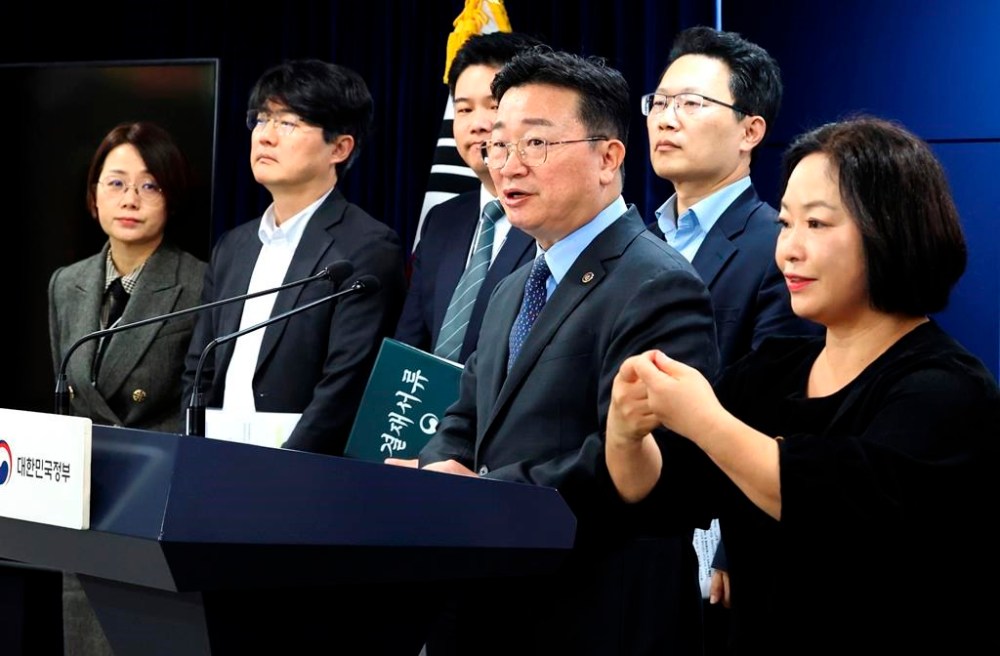South Korea fights deepfake porn with tougher punishment and regulation
Advertisement
Read this article for free:
or
Already have an account? Log in here »
To continue reading, please subscribe:
Monthly Digital Subscription
$1 per week for 24 weeks*
- Enjoy unlimited reading on winnipegfreepress.com
- Read the E-Edition, our digital replica newspaper
- Access News Break, our award-winning app
- Play interactive puzzles
*Billed as $4.00 plus GST every four weeks. After 24 weeks, price increases to the regular rate of $19.00 plus GST every four weeks. Offer available to new and qualified returning subscribers only. Cancel any time.
Monthly Digital Subscription
$4.75/week*
- Enjoy unlimited reading on winnipegfreepress.com
- Read the E-Edition, our digital replica newspaper
- Access News Break, our award-winning app
- Play interactive puzzles
*Billed as $19 plus GST every four weeks. Cancel any time.
To continue reading, please subscribe:
Add Free Press access to your Brandon Sun subscription for only an additional
$1 for the first 4 weeks*
*Your next subscription payment will increase by $1.00 and you will be charged $16.99 plus GST for four weeks. After four weeks, your payment will increase to $23.99 plus GST every four weeks.
Read unlimited articles for free today:
or
Already have an account? Log in here »
Hey there, time traveller!
This article was published 06/11/2024 (342 days ago), so information in it may no longer be current.
SEOUL, South Korea (AP) — South Korea on Wednesday announced a package of steps to curb a surge in deepfake porn, saying it will toughen punishment for offenders, expand the use of undercover officers and impose greater regulations on social media platforms.
Concerns about nonconsensual explicit video contents that were digitally manipulated deepened in South Korea after unconfirmed lists of schools with victims spread online in August. Terrified, many girls and women removed photos and videos from Instagram, Facebook and other social media accounts, while others held rallies calling for stronger steps against deepfake porn.
President Yoon Suk Yeol quickly confirmed the rapid spread of explicit deepfake contents and ordered officials to “root out these digital sexual crimes.” Police are now on a seven-month special crackdown that is to continue until March 2025.

A task force said in a statement that the government has been working with lawmakers on revising laws to increase punishment for perpetrators involved in deepfake porn-related crimes.
It cited a recently amended law that for the first time makes acts of watching or possessing deepfake porn illegal and punishable with up to three years in prison. The maximum punishment for those who produce or distribute deepfake porn contents was increased from five to seven years in prison.
Police have so far detained 506 suspects this year, 411 of them aged between 10 and 19.
The task force said it’ll push for undercover online investigations, even in cases when victims are adults. The law currently authorizes such methods only when victims are minors. The government also plans another revision that would allow authorities to confiscate profits made through deepfake porn businesses.
The task force said it will push to impose a fine on social media platforms more aggressively when they fail to prevent the spread of deepfake and other illegal contents. It said South Korea will plan to increase monitors on social media platforms to 26, from the current 12.
The task force will also expand mandatory educational programs on digital sex crimes at schools, and produce related public awareness videos with celebrities popular with teens and young people in their 20s.
Most suspected perpetrators in deepfake porn cases in South Korea are teenage boys. Observers say the boys target female friends, relatives and acquaintances — also mostly minors — as a prank, out of curiosity or misogyny.
The deepfake porn issue in South Korea has raised serious questions about school programs but also threatened to worsen an already troubled divide between men and women.
The prevalence of deepfake porn in the country has been attributed to a mix of factors, experts say, including heavy use of smartphones, an absence of comprehensive sex and human rights education in schools, inadequate social media regulations for minors, and also misogyny and social norms that sexually objectify women.

